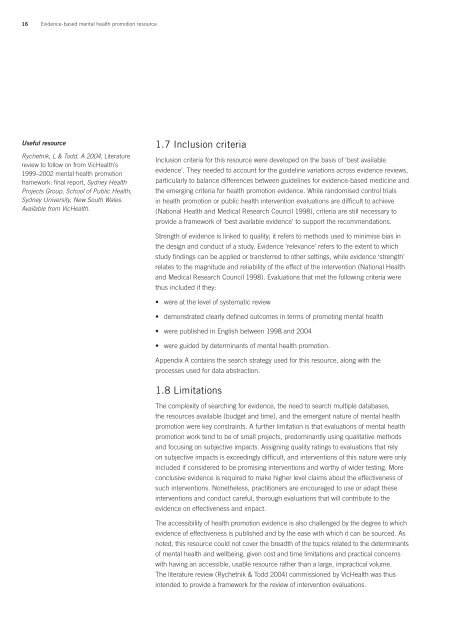Evidence-based mental health promotion resource - health.vic.gov.au
Evidence-based mental health promotion resource - health.vic.gov.au
Evidence-based mental health promotion resource - health.vic.gov.au
Create successful ePaper yourself
Turn your PDF publications into a flip-book with our unique Google optimized e-Paper software.
16 <strong>Evidence</strong>-<strong>based</strong> <strong>mental</strong> <strong>health</strong> <strong>promotion</strong> <strong>resource</strong>Useful <strong>resource</strong>Rychetnik, L & Todd, A 2004, Literaturereview to follow on from VicHealth’s1999–2002 <strong>mental</strong> <strong>health</strong> <strong>promotion</strong>framework: final report, Sydney HealthProjects Group, School of Public Health,Sydney University, New South Wales.Available from VicHealth.1.7 Inclusion criteriaInclusion criteria for this <strong>resource</strong> were developed on the basis of ‘best availableevidence’. They needed to account for the guideline variations across evidence reviews,particularly to balance differences between guidelines for evidence-<strong>based</strong> medicine andthe emerging criteria for <strong>health</strong> <strong>promotion</strong> evidence. While randomised control trialsin <strong>health</strong> <strong>promotion</strong> or public <strong>health</strong> intervention evaluations are difficult to achieve(National Health and Medical Research Council 1998), criteria are still necessary toprovide a framework of ‘best available evidence’ to support the recommendations.Strength of evidence is linked to quality; it refers to methods used to minimise bias inthe design and conduct of a study. <strong>Evidence</strong> ‘relevance’ refers to the extent to whichstudy findings can be applied or transferred to other settings, while evidence ‘strength’relates to the magnitude and reliability of the effect of the intervention (National Healthand Medical Research Council 1998). Evaluations that met the following criteria werethus included if they:• were at the level of systematic review• demonstrated clearly defined outcomes in terms of promoting <strong>mental</strong> <strong>health</strong>• were published in English between 1998 and 2004• were guided by determinants of <strong>mental</strong> <strong>health</strong> <strong>promotion</strong>.Appendix A contains the search strategy used for this <strong>resource</strong>, along with theprocesses used for data abstraction.1.8 LimitationsThe complexity of searching for evidence, the need to search multiple databases,the <strong>resource</strong>s available (budget and time), and the emergent nature of <strong>mental</strong> <strong>health</strong><strong>promotion</strong> were key constraints. A further limitation is that evaluations of <strong>mental</strong> <strong>health</strong><strong>promotion</strong> work tend to be of small projects, predominantly using qualitative methodsand focusing on subjective impacts. Assigning quality ratings to evaluations that relyon subjective impacts is exceedingly difficult, and interventions of this nature were onlyincluded if considered to be promising interventions and worthy of wider testing. Moreconclusive evidence is required to make higher level claims about the effectiveness ofsuch interventions. Nonetheless, practitioners are encouraged to use or adapt theseinterventions and conduct careful, thorough evaluations that will contribute to theevidence on effectiveness and impact.The accessibility of <strong>health</strong> <strong>promotion</strong> evidence is also challenged by the degree to whichevidence of effectiveness is published and by the ease with which it can be sourced. Asnoted, this <strong>resource</strong> could not cover the breadth of the topics related to the determinantsof <strong>mental</strong> <strong>health</strong> and wellbeing, given cost and time limitations and practical concernswith having an accessible, usable <strong>resource</strong> rather than a large, impractical volume.The literature review (Rychetnik & Todd 2004) commissioned by VicHealth was thusintended to provide a framework for the review of intervention evaluations.



